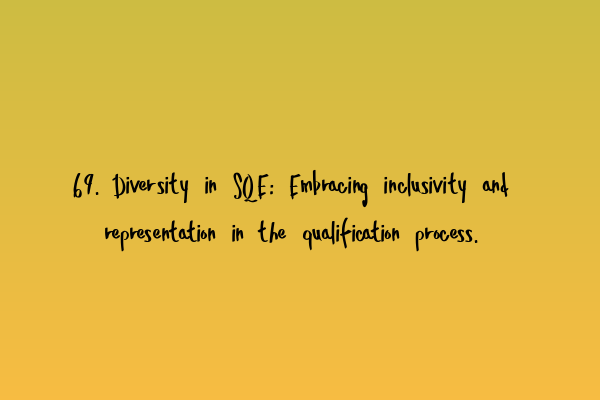Diversity in SQE: Embracing Inclusivity and Representation in the Qualification Process
The legal profession has long been perceived as exclusive and lacking in diversity. However, in recent years, there has been a growing emphasis on creating a more inclusive and representative legal sector. This shift is reflected in the Solicitors Qualifying Examination (SQE), a new assessment that aims to provide equal opportunities for aspiring solicitors from all backgrounds. In this blog post, we will explore the importance of diversity in SQE and how it contributes to a more equitable qualification process.
Why is diversity important in SQE?
Diversity in the legal profession is crucial for a number of reasons. Firstly, it ensures that the legal system is reflective of the society it serves. A diverse legal profession allows for different perspectives and experiences to be brought to the table, resulting in more nuanced and effective decision-making. Additionally, diversity promotes a sense of fairness and equality, helping to create trust and confidence in the legal system among the public.
In the context of the SQE, diversity is essential to ensure that the qualification process is accessible to individuals from all walks of life. By embracing inclusivity and representation, the SQE aims to remove barriers that may have previously limited entry into the legal profession. This is particularly important for underrepresented groups, such as individuals from lower socioeconomic backgrounds, ethnic minorities, and those with disabilities.
The role of diversity in promoting innovation and excellence
Embracing diversity in the SQE is not just about achieving social justice; it also plays a crucial role in promoting innovation and excellence within the legal profession. When individuals from diverse backgrounds are given equal opportunities to enter the legal profession, it opens the door to new perspectives, ideas, and approaches to legal problem-solving.
Research has shown that diverse teams are more likely to identify creative solutions and make better decisions. By encouraging a diverse range of individuals to pursue a legal career through the SQE, the legal profession can benefit from this increased innovation and excellence. Ultimately, embracing diversity in the qualification process will lead to a more dynamic and effective legal sector.
How can the SQE promote diversity?
The SQE has implemented several measures to promote diversity and inclusivity in the qualification process. First and foremost, the exam itself is designed to assess core legal knowledge and skills, rather than focusing on specific academic qualifications. This enables individuals from diverse educational backgrounds to demonstrate their competency and suitability for the legal profession.
Furthermore, the SQE offers a range of accommodations and adjustments for individuals with disabilities, ensuring that the exam is accessible to all candidates. This includes options for extra time, alternative formats, and other reasonable adjustments as necessary. By providing these accommodations, the SQE acknowledges and addresses the unique challenges that individuals with disabilities may face during the examination.
In addition, the SQE actively encourages diversity by providing resources and support for candidates from underrepresented backgrounds. This includes access to free mock tests, practice papers, and interactive learning tools. By offering these resources, the SQE aims to level the playing field and give every candidate an equal opportunity to succeed in the exam.
Conclusion
Diversity and inclusivity are crucial in every aspect of society, including the legal profession. By embracing diversity in the SQE, we can create a more equitable qualification process that provides equal opportunities for aspiring solicitors from all backgrounds. This not only promotes social justice but also fosters innovation and excellence within the legal sector. As the legal profession continues to evolve, it is essential that we prioritize diversity and representation at every stage, starting with the qualification process.
